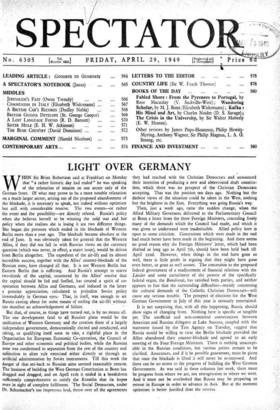LIGHT OVER GERMANY
HEN Sir Brian Robertson said at Frankfurt on Monday that "a rather historic day had ended " he was speaking of the relaxation of tension on one sector only of the German front. Of what may prove to be a more notable relaxation on a much larger sector, arising out of the proposed abandonment of the blockade, it is necessary to speak, not indeed without optimism but still with considerable reserve. The two events—or rather the event and the possibility—are directly related. Russia's policy when she believes herself to be winning the cold war and her policy when she realises she is losing it are two different things. She began the pressure which ended in the blockade of Western Berlin more than a year ago. The blockade became absolute at the end of June. It was obviously taken for granted that the Western Allies, if they did not fall in with Russian views on the currency question (which was never, in effect, a major issue), would be driven from Berlin altogether. The expedient of the air-lift and its almost incredible success, together with the Allies' counter-blockade of the Russian zone, have changed all that. It is not Western Berlin but Eastern Berlin that is suffering. And Russia's attempt to starve two-thirds of the capital, countered by the Allies' resolve that the capital should be fed and fuelled, has created a spirit of co- operation between Allies and Germans, and induced in the latter a genuine appreciation, calculated to prejudice Soviet policy irremediably in German eyes. That, in itself, was enough to set Russia casting about for some means of ending the air-lift without too manifest an acknowledgement of failure.
But that, of course, as things have turned out, is by no means all. The one development fatal to all Russian plans would be the unification of Western Germany and the creation there of a largely independent government, democratically elected and conducted, and taking, or qualifying itself soon to take, a rightful place in the Organisation for European Economic Co-operation, the Council of Europe and other economic and political bodies, while the Russian zone was condemned to separation from the rest of the country and subjection to alien rule exercised either directly or through an artificial administration by Soviet instruments. Till this week the danger of that set-back to Russian aims seemed reasonably remote. The business of building the West German Constitution at Bonn has dragged and dragged, and on April nth it ended in a breakdown sufficiently comprehensive to satisfy the Kremlin that its hopes were in sight of complete fulfilment. The Social Democrats, under Dr. Schumacher's too impetuous lead, threw over all the agreements
they had reached with the Christian Democrats and announced their intention of producing a new and abbreviated draft constitu- tion, which there was no prospect of the Christian Democrats accepting. That was the position ten days ago. Nothing but the darkest views of the situation could be taken in the West, nothing but the brightest in the East. Everything was going Russia's way.
Then, just a week ago, came the sudden change, when the Allied Military Governors delivered to the Parliamentary Council at Bonn a letter from the three Foreign Ministers, conceding freely many of the demands which the Council had made, and which it was given to understand were inadmissible. Allied policy here is open to some criticism. Concessions which were made in the end had much better have been made in the beginning. And there seems no good reason why the Foreign Ministers' letter, which had been drafted as long ago as April 7th, should have been held back till April 22nd. However, when things in the end have gone so well, there is little profit in arguing that they might have gone even better, or gone as well sooner. The concession to the proposed federal government of a readjustment of financial relations with the Lander and some curtailment of the powers of the specifically federal organ, the Bundesrat, has satisfied both parties, and neither appears to fear that the outstanding difficulties—mainly concerning the cultural demands of the Catholic Christian Democrats—will cause any serious trouble. The prospect of elections for the West German Government in July of this year is seriously entertained.
It is not surprising that, with all this happening, Russia should show signs of changing front. Nothing here is specific or tangible yet. The unofficial and non-committal conversations between American and Russian delegates at Lake Success, coupled with the statement issued by the Tass Agency on Tuesday, suggest that Russia would be willing to raise the Berlin blockade provided the Allies abandoned their counter-blockade and agreed to an early meeting of the Four Foreign Ministers. There is nothing unaccept- able in the Russian conditions, but various points remain to be clarified. Assurances, and if it be possible guarantees, must be given that once the blockade is lifted it will never be re-imposed. And there can be no arrest to the progress of building the West German Government. As was said in these columns last week, there must be progress from where we are, not retrogression to where we were. And it must not be overlooked that Russia may be preparing to retreat in Europe in order to advance in Asia. But at the moment optimism is better justified than the reverse.


































